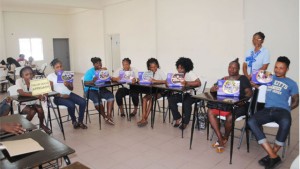
PEP Life Skills Facilitator Ms Gloria Mills instructing a mixed class of PEP Cosmetology and Electrical Trainees at the New Town Community Centre.
Basseterre, St. Kitts (June 4, 2015) — Back in 1988, the Organisation of American States (OAS) initiated a programme to train persons in ‘life skills’ as it had become evident that training in technical skills alone was not sufficient to produce trainees who would become the quality employees that business and industry were seeking.
Cognisant of the need to train well-rounded individuals who would go back into the society armed with both technical and ‘life’ skills, the People Employment Programme (PEP) has in its services a facilitator, Ms Gloria Mills, who teaches life skills to PEP trainees in different disciplines.
“If for example you are a baker, maybe the products you turn out to the public are of a very high standard, tasty and so on, but if you yourself are rude and disrespectful to buyers, they would not be attracted to come to your business,” explained Ms Mills. “So whatever area you may be engaged in, life skills emphasise that your relationship with people, whether at home, in the public, be cordial.”
The Federation of St. Kitts and Nevis is fast evolving into a service oriented country, and to maintain a competitive edge in this highly delicate sector, the country must ensure that its workforce is well trained in the area of life skills. PEP trainees are benefitting from the training being offered to them.
“Life Skills is a discipline in education, which embodies the knowledge, skills, values, and attitude,” commented Ms Mills. “The training has to be applied in everyday living, and it is only in that way the benefits of the training will be realised.
“The content material is topical: We have topics like self-esteem, effective communication, goal-setting, and management; there are workshop standards and ethics, managing personal health, topics related like parenting, youth issues, growth development, just to name some.”
According to Ms Mills, Life Skills as a subject has three categories: the social skills; the cognitive skills; and the emotional coping skills. The last one helps trainees in management skills, managing stress, managing feelings, creating self-awareness, building self-esteem and self-confidence, self-monitoring skills, and resilience skills.
When she started interacting with the PEP trainees, many asked what life skills was all about. But with time they have realised the importance of the lessons, with some confessing that it was not what they thought it was as they now see its value and the sense of it as a life application training that would enhance their business.
“Those classes which I have, they have been verbalising their interest and gratitude,” noted Ms Mills. “There is one class which even says to me they wish that I could be with them more often, because I think they are beginning to see certain benefits.”
Earlier in the year, Ms Mills got hold of a 2015 Royal Bank of Canada calendar and was attracted to the themes used to illustrate the various months on the calendar which made her draw the conclusion that she was not working in isolation as others were also interested in exemplifying the virtues of life skills.
She pointed out that three of the themes that are being studied by the PEP groups, ‘What am I Helping to Build’, ‘Health is Wealth’, and ‘The Community is a Family’ that would have been covered a large part of their training topics, had been highlighted on the calendar.
“When I was leafing through a copy of the calendar, I realised that their themes first of all was ‘Building a Community’,” explained Ms Mills. “The various projects that were highlighted there would have given some light also on what we were doing, ‘What am I Helping to Build’, ‘Health is Wealth’, and ‘The Community is a Family’.
“And it so happened that each one of their illustrated projects that were brought together to make that calendar was lending some light on what we were doing, so I thought it would be useful for the PEP trainees to see that what we were doing we were not doing it in isolation.”
She shared the calendars with PEP Cosmetology and Electrical trainees at the New Town Community Centre, who felt a new sense of appreciation and direction that life skills was a valuable subject that is also recognised by an international banking organisation. She commented that the calendars heighted their interest in their whole approach to life skills.
In Appreciation, Ms Mills wrote to the Branch Manager of Royal Bank of Canada in St. Kitts Mrs Dawn Heyliger pointing out that “Among the lessons drawn from this experience is that as important as business must be to the operation of your institution you have indeed lived up to your promotional message, ‘It’s all about you’.
“Again it is a reminder that people elsewhere have similar challenges and are finding appropriate approaches to tackle them by the components of true education namely — knowledge, Skills, Values and Attitude.”
